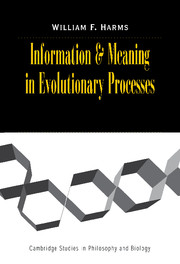Book contents
- Frontmatter
- Contents
- Acknowledgments
- Introduction
- PART I GENERALIZING EVOLUTIONARY THEORY
- PART II MODELING INFORMATION FLOW IN EVOLUTIONARY PROCESSES
- PART III MEANING CONVENTIONS AND NORMATIVITY
- 8 Primitive Content
- 9 Is and Ought
- Epilogue: Paley's Watch and Other Stories
- Notes
- Appendix: Proof of Information Gain under Frequency-Independent Discrete Replicator Dynamics for Population of n Types
- References
- Index
8 - Primitive Content
Published online by Cambridge University Press: 28 July 2009
- Frontmatter
- Contents
- Acknowledgments
- Introduction
- PART I GENERALIZING EVOLUTIONARY THEORY
- PART II MODELING INFORMATION FLOW IN EVOLUTIONARY PROCESSES
- PART III MEANING CONVENTIONS AND NORMATIVITY
- 8 Primitive Content
- 9 Is and Ought
- Epilogue: Paley's Watch and Other Stories
- Notes
- Appendix: Proof of Information Gain under Frequency-Independent Discrete Replicator Dynamics for Population of n Types
- References
- Index
Summary
Many philosophers who are sympathetic to the kind of mathematical evolutionary approach to the general problem of state individuation and environmental coordination developed in Part II will nonetheless contend that it fails as an adequate comprehensive approach to epistemology. For epistemology, according to tradition, is, like ethics, a normative discipline. This means that it is concerned not so much with how people form beliefs, but how they ought to form them. According to the traditional conception, its objective is a normative theory – that is, a theory which goes beyond merely describing the system of rules for knowledge acquisition to generate authoritative pronouncements regarding how one ought to form beliefs. The laws of reason and evidential support are its natural subject matter, the articulation and defense of scientific method its ultimate goal.
It is often said that the problem with naturalistic approaches to the study of knowledge (like the one taken in this book) is that by taking on the mantle of science one foregoes the ability to make any pronouncement regarding how anything ought to be done. Science deals with the facts, and the facts, as we know, are supposed to be value-neutral; the scientific approach to knowledge can thus never tell us anything about how we ought to form our beliefs; naturalistic epistemology is not epistemology at all because it cannot be normative.
- Type
- Chapter
- Information
- Information and Meaning in Evolutionary Processes , pp. 189 - 217Publisher: Cambridge University PressPrint publication year: 2004

